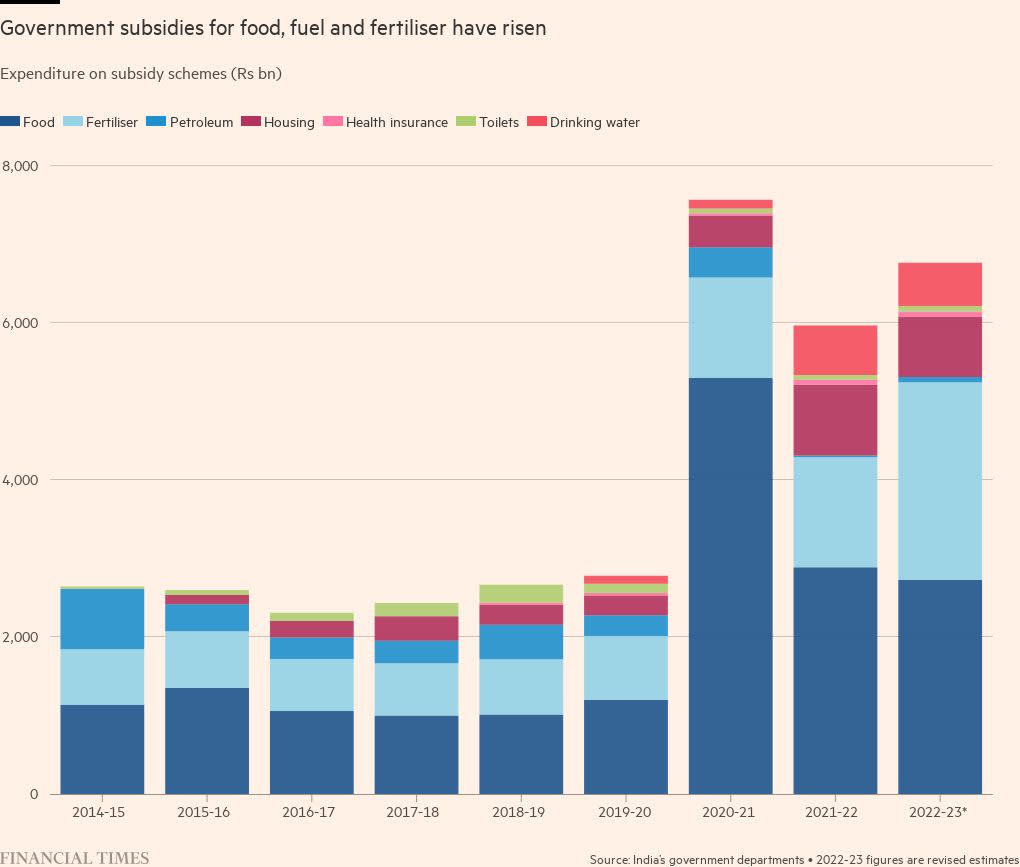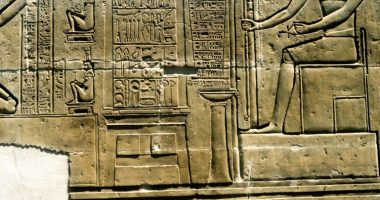Shakkar Bai and her extended family of 16 have a house, free monthly bags of rice and wheat, and cooking gas, all thanks to handouts from Narendra Modi’s government.
“Modi-ji is doing good for us,” declares the 65-year-old family matriarch, using an honorific for India’s prime minister as she sits in a home built in central Madhya Pradesh state with aid from his government. “He is a good man.”
India, the world’s most populous country, has some of the most generous welfare schemes too, including a food grain handout that reaches 813mn people — more than half the population. And Modi’s close association with such help for the poor could play a key role in deciding whether his Bharatiya Janata party retains power at India’s general election, which begins on April 19.
Analysts say government handouts and subsidies, which all political parties deploy and which Indians including Modi derisively call “freebies” or in Hindi rewadis (sweeties), long predate the BJP government.
“It’s not only Modi who does this; everybody does, like the king bestowing favours on you,” says Asim Ali, a political analyst. “There’s a feudal discourse: ‘We are giving you this money with the expectation that you will be grateful to us’.”
Since taking office in 2014, however, Modi has presided over an expansion of programmes for the poor, many of them prefixed with the words “Prime Ministerial” and featuring his name and picture.
So how much is the Modi government spending on such freebies? How does it compare with previous governments? And will it sway how Indians vote?
In the financial year 2022-23, India’s total spending on its seven largest subsidy schemes totalled Rs6.8tn ($82bn), more than twice the Rs2.6tn spent in 2014-15, Modi’s first year in power, government data compiled by the Financial Times shows.
The schemes include the free food grain programme, known by its Hindi acronym PMGKAY, and the housing and health insurance schemes known by their acronyms PMAY and PM-JAY.
Two other programmes for the poor work under Modi’s patronage. Jal Jeevan is a mission to provide Indian households with tap water connections. And one of Modi’s signature campaigns, Swachh Bharat, or “Clean India”, launched in 2014, set out to free Indians from the blight and indignity of open defecation. Since its launch the government has spent Rs909bn on building 115mn toilets.
Some of the welfare programmes with Modi’s name on them long predate his ascent to office.
India saw an expansion of its welfare state under former governments led by the centre-left opposition Indian National Congress, but the governments they led were prone to corruption and waste.
Analysts say Modi has transformed welfare distribution and reduced the scope for pilferage by linking entitlements to biometrics such as fingerprints via its pioneering Aadhaar digital ID system.
One example of a welfare scheme that predated Modi but the prime minister then made his own is PMGKAY, the food handouts scheme.
Food security is a long running issue in India, which suffered major famines in the past and whose Supreme Court in 2001 upheld a constitutional right to food. After a long-running push by civil society groups and public interest litigants, India passed a national food security act in 2013, under a Congress-led government that the BJP ousted the following year.
The act entitled up to 75 per cent of India’s rural population and up to 50 per cent of city dwellers to subsidised food for a nominal payment.
In 2020, when millions of Indians lost their work during the Covid-19 pandemic, Modi refashioned the scheme as PMGKAY and made the entitlement of 5kg of food grain per eligible Indian not just subsidised but free. Last year his government extended the scheme for another five years, a move widely seen as pitched to voters in the run-up to the poll.
The Indian leader’s face is displayed in the “fair price shops” where beneficiaries come to collect their free grain. In one indication of how important this is, finance minister Nirmala Sitharaman in September 2022 scolded a local official in Telangana state after noticing Modi’s picture was not on display in a ration shop.
In February, Indian media reported that the Food Corporation of India, the state agency responsible for buying and distributing grain, told its regional offices to procure bags for PMGKAY with a logo featuring Modi.
“Despite Modi’s own criticism of freebies, everything is being renamed, and even free food grain bags have become electoral advertisements,” said Swati Narayan, author of Unequal, a book about Indian poverty and development.
A geographical breakdown of PMKGAY beneficiaries shows the highest proportion of Indians are receiving free food in the country’s poor northern and eastern states, led by Bihar, where 84 per cent of inhabitants get it. The rate of handouts is lowest in Delhi and Himachal Pradesh in the north and the relatively wealthy states of Tamil Nadu and Kerala in the south.
Despite the increase in handouts, social spending as a proportion of the government budget has not gone up, apart from a spike during the pandemic. Under Modi, spending on education, health and other areas has fallen, according to research by the Centre for Policy Research, a New Delhi think-tank.
“The political genius of Modi lies in the fact that he is not a big spender,” said Yamini Aiyar, a New Delhi-based public policy scholar. “He has been able to be welfarist without being fiscally profligate, and the use of technology has created a veneer of competence.”
Bai, the family matriarch, certainly plans to vote for Modi in the upcoming election, which will be held over more than six weeks, ending on June 1.
The government assistance left her extra money to spend on her youngest son’s wedding and schooling for children in her household. “We can now think of doing small things on our own because we don’t have to think about buying food,” she said.
Additional reporting by Jyotsna Singh in New Delhi
Read More: World News | Entertainment News | Celeb News
FT












